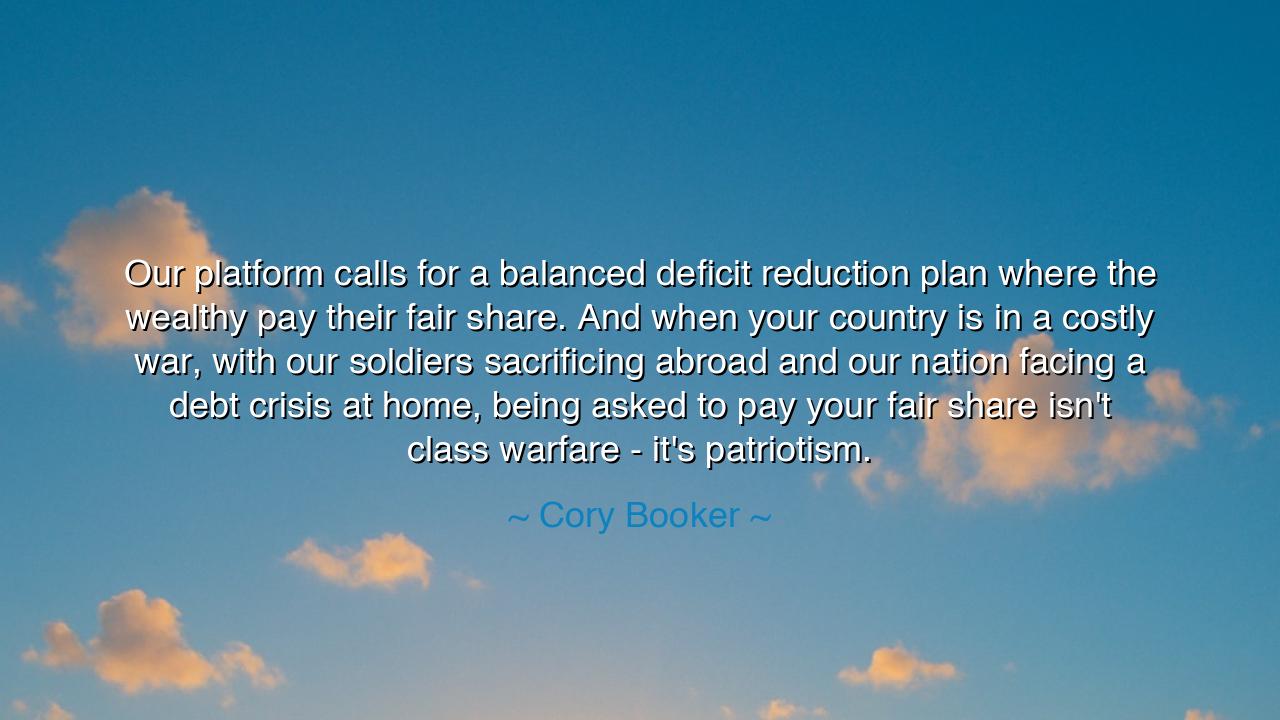
Our platform calls for a balanced deficit reduction plan where
Our platform calls for a balanced deficit reduction plan where the wealthy pay their fair share. And when your country is in a costly war, with our soldiers sacrificing abroad and our nation facing a debt crisis at home, being asked to pay your fair share isn't class warfare - it's patriotism.






“Our platform calls for a balanced deficit reduction plan where the wealthy pay their fair share. And when your country is in a costly war, with our soldiers sacrificing abroad and our nation facing a debt crisis at home, being asked to pay your fair share isn't class warfare – it's patriotism.” Thus spoke Cory Booker, giving voice to a truth that nations have known since the dawn of republics: that in times of trial, when the burdens of war and debt weigh heavily, the strength of the nation is measured not in the gold of the few, but in the shared sacrifice of the many. His words strike at the heart of the struggle between justice and self-interest, declaring that to give when one has much is not punishment but duty, not war but patriotism.
The origin of this saying lies in the long tradition of states calling upon their wealthiest citizens to bear greater burdens in times of crisis. From the earliest days of democracy in Athens, where the richest citizens were compelled to fund ships for the navy, to the great wars of the 20th century, where taxes and bonds sustained armies abroad and families at home, the principle was the same: with greater blessings come greater responsibilities. Booker, in his age, echoes this ancient truth—that fairness is not about envy, but about unity, and that to sustain a nation requires the willing contribution of all.
History itself provides vivid proof. Consider the United States during World War II, when soldiers fought and died on distant shores while families rationed food and fuel at home. Taxes were raised, war bonds were sold, and the wealthiest bore heavy obligations. Yet no one called this class warfare. It was understood as the price of survival, the truest expression of patriotism—to give one’s treasure, even as others gave their blood. In that era, the wealthy who contributed were not scorned but honored, for they upheld the same principle of sacrifice as the soldiers in the field.
But Booker also points to the danger of rhetoric that seeks to divide. Too often, when calls are made for the rich to contribute more, it is framed as envy, as resentment, as war between classes. Yet his words remind us that this is a distortion. True patriotism does not pit rich against poor, but binds them together in the shared fate of the nation. To resist fair contribution in times of national crisis is not loyalty, but selfishness. And to call fairness "war" is to deny the essence of unity itself.
We see similar lessons in the history of Rome. When the Republic was threatened, the wealthy patricians and the common plebeians were asked to give what they could—men, arms, coin, or food. When both classes rose together, Rome endured and triumphed. But when the wealthy withheld their support, fearing loss of privilege, discord festered, and the Republic was weakened. Thus Booker’s words remind us that the survival of a nation rests not upon wealth hoarded, but upon wealth shared for the sake of the common good.
The lesson for future generations is clear: true patriotism is not measured only by waving flags or singing hymns, but by sacrifice. If soldiers can give their lives on foreign soil, surely citizens at home—especially those most blessed—can give their fair share to sustain the homeland. To refuse such duty is to break faith with the very nation that grants prosperity; to embrace it is to bind oneself to the fabric of the republic with honor.
Practical actions flow from this wisdom. Support policies that ensure fairness in times of national need. Do not allow rhetoric to blind you to justice—recognize that patriotism demands more from those who can give more. If you are blessed with wealth, give generously in service to your country and community. If not with wealth, then with time, labor, or compassion. In this way, all contribute according to their means, and the burden of the nation is lightened.
So let Booker’s words be remembered: “Being asked to pay your fair share isn't class warfare – it's patriotism.” For in times of hardship, the true measure of love for one’s country is not how little we can give, but how much we are willing to share for the sake of all. And in that sacrifice, the nation is not diminished but made whole, not weakened but strengthened, not divided but united in the spirit of patriotism.






AAdministratorAdministrator
Welcome, honored guests. Please leave a comment, we will respond soon